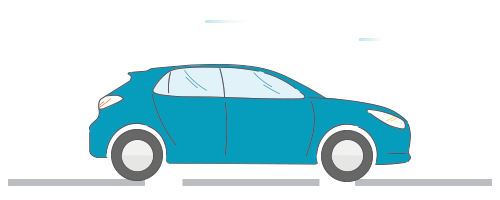As much as we’re tempted to break into Chris Rea’s classic, we know time is precious! So, rather than subjecting to you to a breakdown of lyrics (that we’re sure you already know), we are taking a look at the experience and impact of different travel options for making that big Christmas trip!
Maybe you drive from Cornwall to Cambridge back to see family every year, or your annual journey may cover the east coast – going from Norwich to Newcastle to see school friends each holiday season. Whatever your ‘big trip’ entails and whoever it’s to spend time with, we understand why it’s an essential journey. Maybe it’s just time to consider how you get there…
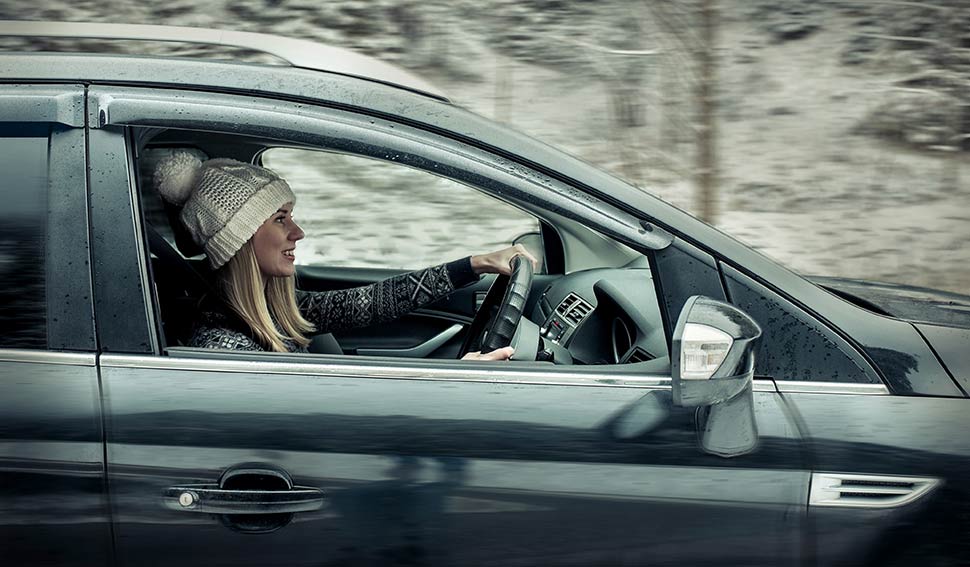
With millions of combinations of car brands and ages, trip lengths and geography as well as available alternatives, there are far too many variables for us to give every comparison. Plus we’re sure you’d rather we spent our time ensuring you get an exemplary scrap car recycling service! However, what we can do is take a realistic look at an average trip that could be taken across the UK this Christmas and see how driving measures up to the main alternatives.
We’re going to focus on the big comparable issues – the cost, the environmental impact, and the time and convenience…
Clearly there are many external factors that could affect these trips – from road closures, rail strikes, severe weather conditions, lost baggage and family’s falling out with the whole seasonal shabang being cancelled while you’re en route! But for this example, we’re going to work on the basis everything works pretty much as it should!
We’ve based our theoretical trip on a route from Matford in Exeter to Leith in Edinburgh. That journey is 453 miles by road, or approximately 362 miles as the crow flies!
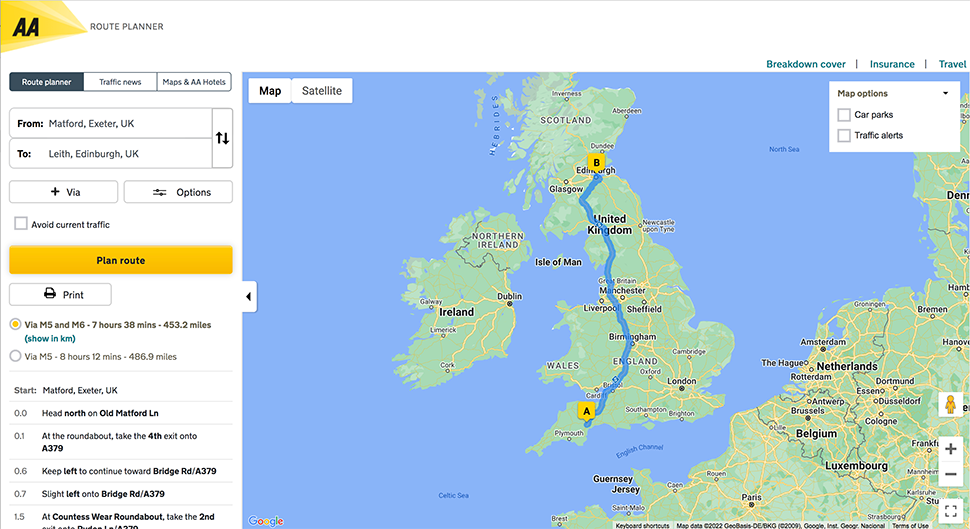
Covering the South West to Scotland, we’re hoping at least a section of the journey will be familiar to some of you. We’ll be working out the stats based on one of the most common cars found on UK roads – a Ford Focus, around 10 years old, and the most convenient rail and flight services local to both cities, all travelled within a week of Christmas by one person. Obviously you could be making the trip as a couple or family, which could mean splitting fuel costs or adding on additional plane seat costs – all of those things you need to consider based on your personal circumstances.

The cost of your annual trip home may always have seemed expensive, particularly if you’re travelling a long distance, but this year, with finances invariably tight, cost may well be key to your decision to travel at all.
 |
The cost of using your car |
Such a long trip would undoubtedly have a ‘wear and tear’ cost to consider, but we’re just going to look at fuel costs… At the time of publishing, the average pump price in the UK for unleaded petrol is around 163p per litre (the government publishes weekly road fuel prices) and according to Honest John, a Ford Focus 2011-2014 will do an average of 45.7 MPG. We then used the FleetNews Fuel Cost Calculator to work out the total fuel cost, which comes to £73.09.
You need to add the inevitable service station stops for a coffee, and fuel prices do vary across the country but this is the figure we’ll use for comparison, and of course it won’t go up significantly even if there’s four people travelling in the car!
 |
The price of your plane journey |
Flight costs can vary wildly depending on the time and date you travel, but we’ve picked a flight on the Thursday before Christmas – 22nd December, setting off just after noon. The Logan Air flight from Exeter Airport is £170 one way. Over double the car’s fuel costs for just one traveller!
If you can’t get a lift, the cost of getting to the airport, and parking if you’ve driven yourself, should also be considered. Although for this example Matford is only a 10 to 15 minute drive away and parking, if pre-booked, is relatively cheap, but it’s still an added expense.
 |
Tracking the cost of your train tickets |
The cheapest train fare for 22nd December we could find at the time of publishing, is £125. That fare is available at three different times in the day, but all of those journeys include 2 changes. Direct trains available the same day are all priced over £200, which at significantly more than a flight and subject to the same increases when it come to additional tickets, getting to the station and maybe parking, make this far from the most economically appealing option!
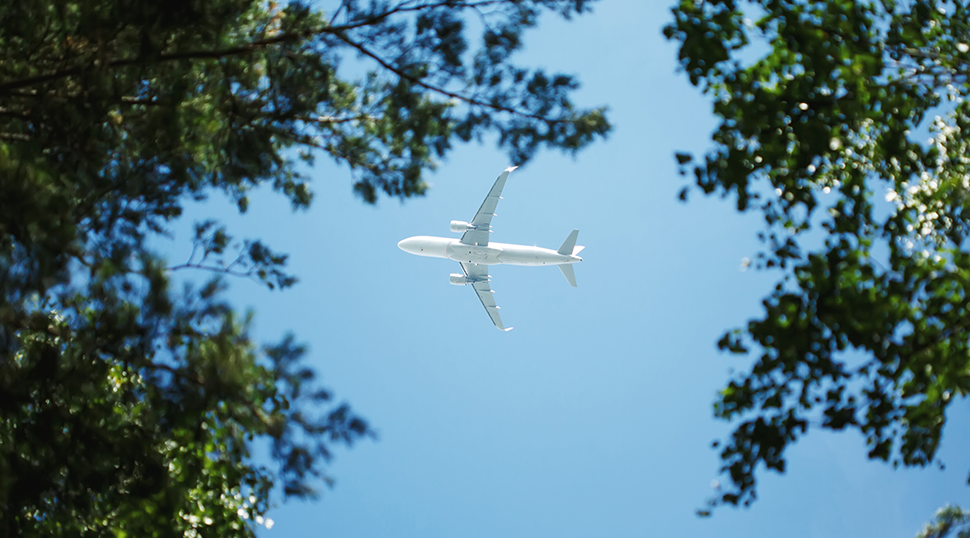
Although journeys like this would no doubt fall into an emotional category of ‘essential travel’ it’s more important than ever to consider the environmental impact of our chosen transport method. We’ve based the environmental stats on the carbon footprint of the single, one-way journey.
 |
Driving’s impact on the environment |
Obviously there would be a huge variance in this figure comparing a small electric car with a twenty year old diesel 4×4! However, we’re sticking with averages, and our 10 year old petrol Focus was estimated as producing 107.70 kg CO2 when we used ComCar’s emissions calculator. This is undoubtedly a high figure and one that makes many of us drivers uncomfortable, especially when you consider the carbon footprint would be doubled by the return journey.
 |
Flying’s impact on the environment |
When you search most flights these days, the carbon footprint is declared along with the times and cost. Loganair stated this flight had estimated emissions per passenger of 92 kg CO2, which although high, surprised us that it compared favourably to driving. (It should be noted that the tool we used to calculate the train journey’s ‘footprint’ offered the comparison for a plane journey at 158.81 KG CO2 – significantly more than the information given by the flight company.)
 |
Your rail journey’s impact on the environment |
Rail travel is known to have a relatively low carbon footprint compared to road and air travel and this journey is no exception. We actually used a different train line’s calculator – LNER – and the journey from Exeter to Edinburgh was put at 25.85 KG CO2. Even allowing a large margin of error, that stat is impressively low.

This one is tricky to score, as convenience is a personal perspective – you may think the stress of finding a parking space at the train station is more than made-up-for by being able to sit and read your kindle undisturbed for two hours but others may disagree! Alternatively, being able to take as much luggage as you like in your car could be a big tick for convenience, but then having to stay alert for several hours driving may be a stressful prospect for many. You get the idea, anyway, here’s the average times to compare and other convenience issues to consider and weigh up!
 |
Is driving going to dampen your Christmas spirit? |
The AA route planner service suggests a route via the M5 and M6 and estimates a travel time of 7 hours 38 mins to cover the 453.2 miles. That’s a long car journey by most people’s standards but it would be managed well within a day.
It may be that you don’t have the time or energy to do anything other than a direct journey, but at least your car gives you the option of stopping en route. Whether you take in the views of the Cotswolds, or fit in some last minute Christmas shopping in Manchester, there’s plenty of places of interest as you travel North!
 |
‘Plane’ sailing for the season |
If you are only looking at the flight time, a plane ride is always going to win hands down, and with a total of just 80 minutes in the air, this journey is no exception. However, you do have to consider the time that has to be spent getting to the airport, and the recommended arrival time to allow for check in and security, which still stands at two hours, even for internal flights.
 |
Train times ticking the box? |
Exeter to Edinburgh on the train is generally advertised as taking 8 hours, but even with two changes our chosen journey was listed as 7 hours 40 minutes. This obviously doesn’t come close to competing with the plane journey and is two minutes slower than driving (non-stop)!
It should be noted that train times for many journeys across the country would certainly compete preferably with driving and you wouldn’t have to factor in driving rest stops, but this specific journey doesn’t offer any time savings.
Convenience wise, a train journey can be a pleasure, but that can be dependent on the services available – if the buffet car isn’t open, your seat reservation has been lost and the wi-fi isn’t working it might not be the experience you may have paid a premium for. However, you can always ‘switch off’ and take in the scenery or even have a sleep!
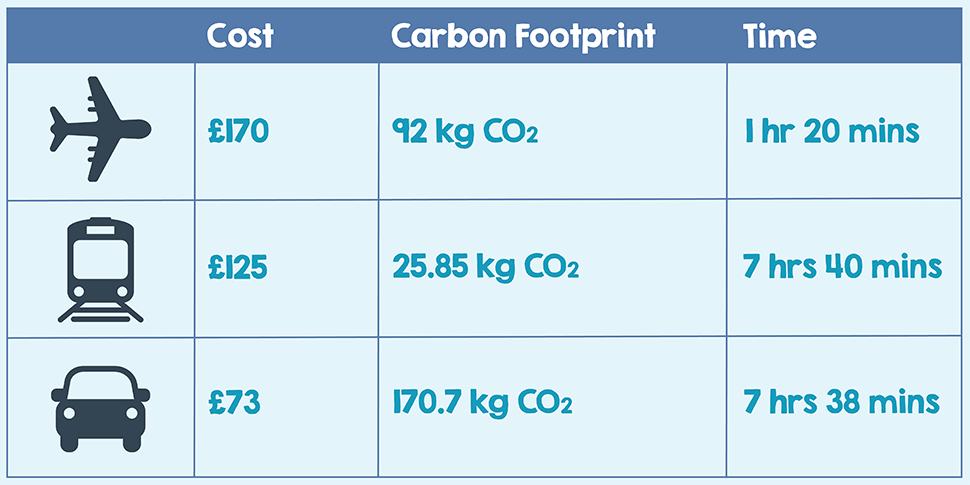
Undoubtedly, the train trip is the winner when it comes to protecting the environment, but as much as you might want to reduce your carbon footprint, cost may well be a barrier this year, and the speed of this journey certainly isn’t selling setting off from a station. Plus you have to add on the time and cost of getting to the station itself and on to your final destination.
When it comes to time, flying is a clear winner, even adding on your extra travel and early arrival time. However, many people feel the stress of flying and the pre-departure experience takes the edge off the convenience of a quick journey. A flight’s carbon footprint is also a moral dilemma to many. While the declared 92 kg CO2 per passenger sounds relatively reasonable, it’s a very different figure covering the entire flight and every seat would have to be filled to keep the emissions under 100 kg CO2 per passenger!
The car certainly wins on cost, and arguably in the convenience stakes when you are in charge of your own route, rest stops and door to door service. If you get past the hours behind the wheel, the real issue here is the emissions. So the sooner we can all swap to cleaner transport the better. Sadly, this year is unlikely to be the time many people can make that switch with finances so tight.
It’s all food for thought… and at the end of your journey there’s a lot of Christmas food to consume before heading back again! On that note you may wish to check out our blog on eating yourself over the drink drive limit. You may well be surprised by the results!
